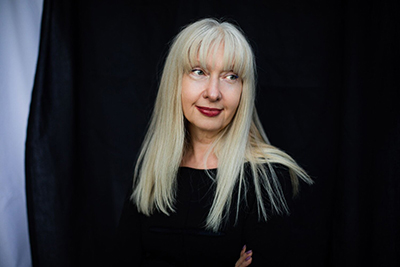Victoria Polevá

Born: September 11, 1962, Kyiv, Ukraine
Symphony No. 3, White Interment
- Composed: 2002 for oboe and strings; revised for orchestra in 2003 as Symphony No. 3
- Premiere: 2009 by the Rivne [Ukraine] Chamber Orchestra, conducted by Petro Tovstukha
- CSO Notable Performances: These are the CSO’s first performances of this work.
- Instrumentation: 4 flutes (incl. piccolo), 2 oboes, 2 clarinets, 2 bassoons, 4 horns, 2 trumpets, 3 trombones, tuba, timpani, glockenspiel, harp, piano, strings
- Duration: approx. 14 minutes
Viktoria Polevá, one of the most prominent of Ukraine’s many gifted contemporary composers, was born in Kyiv in 1962 and received her early training in music from her father, himself a composer. Polevá continued her education at the Shchedryk Children’s Choir Studio, Glière Kyiv State Higher Music School and Kyiv State Conservatory, where her principal composition teacher was Ivan Karabyts. She taught at the Conservatory following her graduation in 1989 and remained there when it was reorganized in 1995 as the Ukrainian National Tchaikovsky Academy of Music (Tchaikovsky frequently visited a sister who lived in eastern Ukraine and included traditional Ukrainian songs in his Symphony No. 2, subtitled “Little Russian,” as the region was known in Tsarist days), after she was awarded a graduate teaching fellowship, teaching composition at the school until 1998, when she took over the school’s Music Information Technologies Department. Polevá left academia in 2005 to devote herself to composing. Since then, she has created an extensive catalog encompassing operas; ballets; accompanied and a cappella choral and vocal works set to folk, classical and sacred texts; and pieces for orchestra, chamber ensembles and piano with referential aspects, many in a so-called “sacred minimalist” style that has also found wide acceptance in the works of Arvo Pärt, Henryk Górecki, John Tavener and others. Polevá’s works have been performed internationally by leading conductors, soloists, chamber ensembles and orchestras and recognized with numerous honors, including the Shevchenko National Prize of Ukraine, Kyiv Art Prize, Boris Lyatoshinsky Prize and Levko Revutsky Prize, first prizes in the International Spherical Music Competition and All-Ukrainian Composers’ Competition, and residencies at new music festivals in Ukraine, Sweden, Finland, Switzerland, Italy, Poland, United Arab Emirates, Peru and Chile.
The title, character and form of Polevá’s White Interment, composed for oboe and strings in 2002 and revised for orchestra in 2003 as her Symphony No. 3, are indebted to the grim poem "Teper’ Vsegda Snega" (“Now Always Snow”) by Russian avant-gardist Gennady Aygi (1934-2006), which opens “Like snow the Lord is all there is/When all there is is snow/When the soul is all there is/The snows the soul and light/But still just this/That there are those/Like death is all there is…”
For a performance of White Interment by the Bavarian State Orchestra and conductor Vladimir Jurowski at the Barbican in London in September 2023, composer, editor and music scholar Joanna Wyld wrote, “The work is founded on the rhythm of the words ‘teper’ vsegda snega,’ and evokes the sense of being trapped in an icy prison: drawn into a blizzard, buried beneath a snowdrift, succumbing to sleep as the surrounding space implodes. These claustrophobic impressions are conjured using static effects designed to provoke an almost psychedelic response in the listener. Blocks of sounds are structured using classical allusions, including circulatio (Latin for ‘circle’), a whirling melody that evokes the infinity sign; catabasis (Greek for ‘descent’), represented by a falling shape; the ascending anabasis (Greek for ‘climbing’); and aposiopesis (Greek for ‘concealment’ or ‘disguise’), reflected by a general pause depicting death and eternity.”
—Dr. Richard E. Rodda